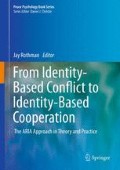Abstract
After protracted racial tensions that culminated in what was variously called civil unrest and riots in 2001 The Cincinnati community was in crisis. Scaling up, the Action Evaluation process was adapted and used to launch a “Police-Community Relations Collaborative process.” So began a year long process that engaged thousands of citizens in Cincinnati in a truly innovative, inclusive and participatory problem-solving process paving the way for a landmark federal court agreement lauded by police experts around the country as a new model.
Access this chapter
Tax calculation will be finalised at checkout
Purchases are for personal use only
Notes
- 1.
1 Personal communication, May 11, 2011.
- 2.
2 The ARIA Group, Inc. is a conflict resolution organization based about 60 miles north of Cincinnati. The company’s involvement was catalyzed and initially funded by New York-based Andrus Family Fund. The author is the president of ARIA.
- 3.
- 4.
4For a full overview of the process see http://www.socsci.uci.edu/~pgarb/istudies/applied/presentations/site/index.html)
- 5.
- 6.
6See BBC Film, Driving While Black, Product Type: Video; ISBN-13: 9780749232634; Length: 30 min; Publication Date: 2001; Publisher: The Open University/BBC.
- 7.
- 8.
8 One of the counter-intuitive aspects of the process of building broad intergroup consensus using the Action Evaluation process is that all participants must choose a single stakeholding group, or identity group, to respond from. This can cause dilemmas for people who have many identity aspects that are salient to the issue. For example, a 24 year-old African American Police Officer must choose only one of those three identifiers from which to respond (African American, Police, Youth). Nonetheless, we find this choice and focus is constructive and ultimately when the different groups are brought together to reach overarching consensus forges a powerful, pluralistic, dynamic that moves the process forward.
- 9.
- 10.
The ideal of an advisory group of collaborative leaders in itself never fully coalesced as hoped – “remember,” warned the judge when I complained of continued adversarial attitudes, “they are still gladiators.”
- 11.
11 From BBC Film, “Driving While Black,” 2001.
- 12.
12 In the conclusion, “lessons learned” I will revisit these choices and suggest how I would make them differently, and do now.
- 13.
13 For more information about this complex dynamic see http://www.enquirer.com/editions/2001/12/04/loc_mayor_boots_rev.html
References
Amir, Y. (1998). Contact hypothesis in ethnic relations. In E. Weiner (Ed.), The handbook of interethnic coexistence (pp. 162–181). New York: Continuum.
Argyris, C. Putnam, R., & Smith, D. (1985). Action science: Concepts, methods, and skills for research and intervention. San Francisco: Jossey-Bass.
Eck, J., & Rothman, J. (2006). Police community conflict and crime prevention in Cincinnati, Ohio: The collaborative agreement. In J. Bailey (Ed.), Public security and police reform in the Americas. Pittsburgh: University of Pittsburgh Press.
Friedman, V., Rothman, J., & Withers, W. (2006). The power of “why”: Engaging the goal paradox in program evaluation. American Journal of Evaluation, 27(2), 1–18.
Fung, A. (2006). Empowered participation: Reinventing urban democracy. Princeton: Princeton University Press.
Lederach, J. (1995). Preparing for peace: Conflict transformation across cultures. Syracuse: Syracuse University Press.
Lederach, J. (1997). Building peace: Sustainable reconciliation in divided societies. Washington, DC: USIP Press.
Osborne, K. (2011). Reflections on riots & race. A decade later, differing views persist on causes, aftermath. http://www.citybeat.com/cincinnati/article-23047-reflections_on_riots.html. Accessed 6 Apr 2011.
Rothman, J. (1997). Action Evaluation and Conflict Resolution Training: Theory, Method and Case Study. International Negotiation, 2, 451–470.
Rothman, J. (2006). Identity and conflict: Collaboratively addressing police-community conflict in Cincinnati, Ohio. Ohio State Journal on Dispute Resolution, 22(1), 105–132.
Rothman, J., & Land, R. (2004). Cincinnati police-community relations collaborative. Criminal Justice, 18(4), 35–42. Winter.
Sherif, M. (1966). In common predicament. Boston: Houghton Miflin Books.
Verba, S. (1961). Small groups and political behavior. Princeton: Princeton University Press.
Author information
Authors and Affiliations
Corresponding author
Editor information
Editors and Affiliations
Rights and permissions
Copyright information
© 2012 Springer Science+Business Media New York
About this chapter
Cite this chapter
Rothman, J. (2012). Applying Action Evaluation on a Large Scale: Cincinnati Police-Community Relations Collaborative – Successes, Failures and Lessons Learned. In: Rothman, J. (eds) From Identity-Based Conflict to Identity-Based Cooperation. Peace Psychology Book Series. Springer, New York, NY. https://doi.org/10.1007/978-1-4614-3679-9_11
Download citation
DOI: https://doi.org/10.1007/978-1-4614-3679-9_11
Published:
Publisher Name: Springer, New York, NY
Print ISBN: 978-1-4614-3678-2
Online ISBN: 978-1-4614-3679-9
eBook Packages: Behavioral ScienceBehavioral Science and Psychology (R0)

